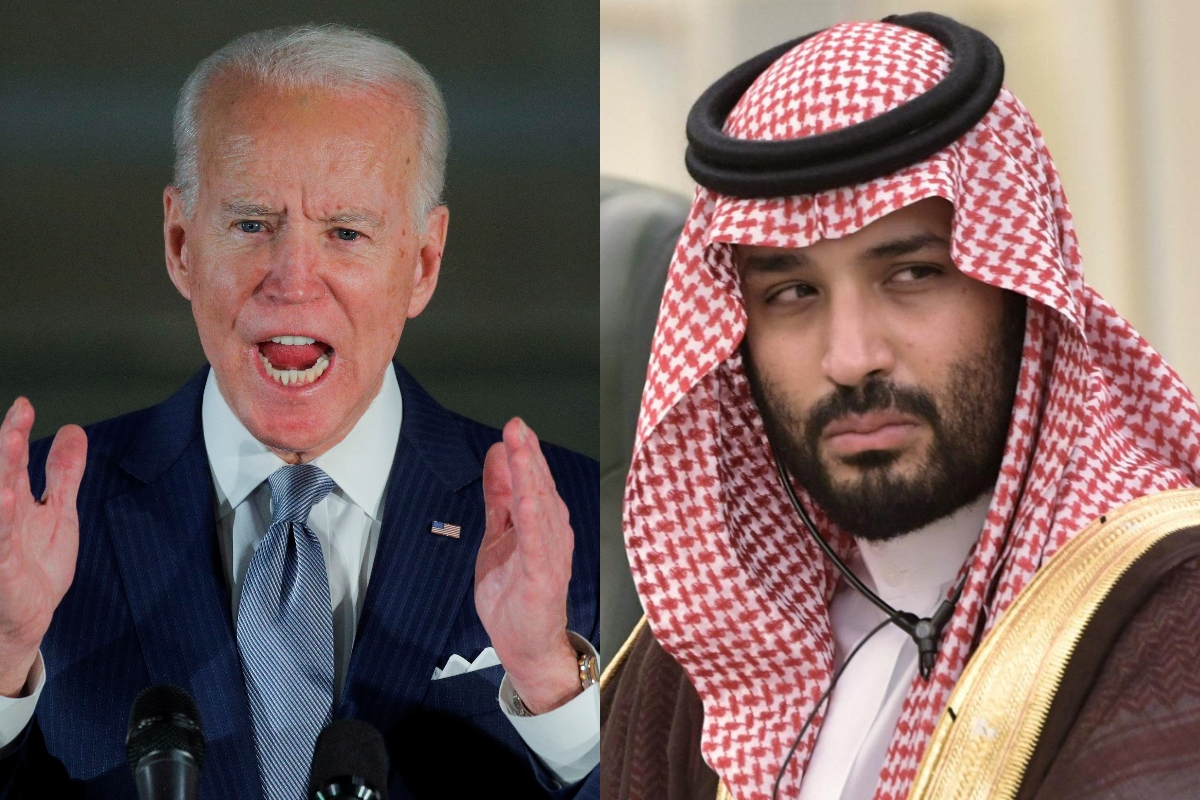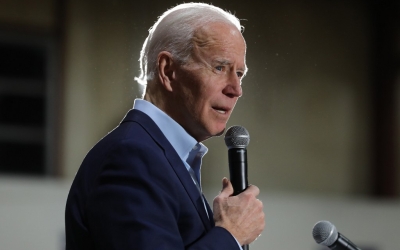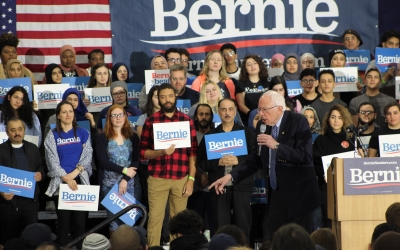No radical break: How US-Saudi ties may shape up under Joe Biden

Joe Biden is the "return to normalcy" candidate. The former vice president is not promising major reforms or status quo-altering policy proposals. Last year, he pledged to a group of wealthy donors that "nothing would fundamentally change" under his watch.
His victory in the Democratic primaries may have come as a relief for industries and countries that want to maintain a business-as-usual approach to Washington. US-Saudi relations, in particular, were spared a more hardline anti-Riyadh nominee in the form of Bernie Sanders or Elizabeth Warren.
With Biden - who is advocating change in tone, not structures - Riyadh may find itself with a less committed ally in the White House, but a transformative reassessment of the US-Saudi bilateral ties is unlikely, experts say.
"The fact that Biden will be the nominee is definitely a signal that US-Saudi relations will not change radically," said Kristian Coates Ulrichsen, a Middle East fellow at Rice University's Baker Institute for Public Policy.
"As a centrist, Biden will continue to engage with Saudi Arabia. He might be less of a shield to Mohammed bin Salman from congressional pressure than the Trump White House. But there's less chance of a rupture or a more radical break than there would have been otherwise."
New MEE newsletter: Jerusalem Dispatch
Sign up to get the latest insights and analysis on Israel-Palestine, alongside Turkey Unpacked and other MEE newsletters
Growing wariness of Saudi Arabia
With congressional Democrats denouncing Donald Trump for his close ties to Saudi Arabia over the past three years, the call for fundamental change in ties between Riyadh and Washington seems deeply entrenched in the party's politics.
Democratic lawmakers have urged Trump to hold Saudi Crown Prince Mohammed bin Salman personally accountable for the murder of US-based journalist Jamal Khashoggi at the hands of Saudi government agents at the kingdom's consulate in Istanbul.
American media outlets widely reported late in 2018 that the CIA concluded that bin Salman ordered the assassination. And the Senate passed a unanimous resolution denouncing the crown prince. But Trump has continued to defend the kingdom's rulers, resisting pressure to make public the US intelligence community's findings about the killing.
Since the murder, Democratic legislators have publicly bashed the crown prince, often addressing him with terms usually reserved for America's enemies, not allies.
'The fact that Biden will be the nominee is definitely a signal that US-Saudi relations will not change radically'
- Kristian Coates Ulrichsen, Rice University
Moreover, last year, Congress passed a resolution to end US support to the Saudi-led war in Yemen, which was eventually vetoed by Trump. The legislative body also tried to block an emergency authorisation by the White House to sell weapons to Saudi Arabia without lawmakers' approval.
Jean-François Seznec, a Middle East expert who teaches at the Johns Hopkins School of Advanced International Studies in Washington, said some of the Democratic wrath against Riyadh may have been a "cudgel" against Trump, rather than a push to reposition America's stance in the region.
Saudi Arabia and a Biden administration, he added, would need to reach a compromise where "both sides will give in something" without risking the alliance.
The Saudis would free some dual national and liberal-leaning political prisoners, Seznec said. They would also have to "give up" someone for the Khashoggi murder - possibly Saud al-Qahtani, a top aide to bin Salman said to have orchestrated the assassination.
On the other side, the US would commit to continuing to arm Saudi Arabia, realising that the defence industry is creating jobs with the global economy poised for a major recession after the Covid-19 crisis, he added.
And with both the United States and Saudi Arabia having Iran as their perceived top enemy, the countries are set to prolong their marriage despite the mounting criticism against the Saudi crown prince in the United States.
"I think there will be negotiations because neither party, whether the Democrats or Republicans, can afford to ever break with Saudi Arabia, especially when Iran is still and will still be the main enemy of the United States," Seznec told MEE.
During his tenure as Barack Obama's vice president, Biden played an active role in promoting the Iran nuclear deal in Congress, and as a candidate, he said he would revive the pact if elected.
Trump had nixed the multilateral agreement, known as the Joint Comprehensive Plan of Action (JCPOA), in May 2018 with the explicit backing of Riyadh.
Both Seznec and Ulrichsen said rejoining the agreement will not be as simple as signing it again.
Seznec said the hardliners in Iran will not be open to renegotiating the pact. Pro-Israel forces in Congress, including within the Democratic Party, will also object to reentering the agreement.
"I don't think the perception of the threat by Iran will change in Washington whether Biden is there or not," he said.
For his part, Ulrichsen said new US-Iranian negotiations would have to include the Gulf state, and the Iranians may be hesitant to commit to another deal that could be scrapped by the next administration.
"The Iranians may well refuse simply to come back to the table," he said.
'Calculated balance'
The same Obama-Biden administration that signed the Iran deal irking Riyadh, also backed the kingdom in its war in Yemen.
The Saudi-backed coalition had the blessing and material support of the Obama administration when it started its bombing campaign against Yemen's Houthi rebels in 2015.
But the US political landscape has shifted over the past five years with opposition to the Saudi-led war becoming a major foreign policy issue for Democrats.
A Democrat in the White House would find it almost impossible to maintain Trump's level of support to Saudi Arabia against the recommendations of rights groups and his party's congressional caucus.
Marcus Montgomery, a fellow at the Arab Center Washington DC who tracks congressional affairs, said Biden would try to distance his administration from the war in Yemen without completely cutting off support to the kingdom's war efforts.
"The war in Yemen, that's something very visible, very public," said Montgomery. "Hopefully the war is over by January 2021, but I wouldn't be surprised if Biden offers some kind of support, but obviously not as public and visible as it has been under Trump."
Ulrichsen also said Biden is likely to pressure the kingdom to end the war without withdrawing all US support to the Saudi-led coalition.
"Biden may put more pressure on the Saudis to commit to a political process to end the fighting and move towards a form of post-conflict reconstruction," Ulrichsen told MEE.
"There will be less of that blank check to continue the fighting that at times the Trump administration seems to have provided by resisting congressional pressure."
Biden himself has often abandoned his centrism when talking about the kingdom. At a debate in November, he said he would stop selling weapons to Saudi rulers, vowing to "make them pay the price" for Khashoggi's murder.
However, presidents seldom govern with the same vigorous soundbites they provide on the campaign trail.
Ulrichsen said bipartisan congressional pressure for revising the alliance with Saudi Arabia will likely continue if Trump leaves office, leaving a Biden presidency in a delicate situation.
"There will have to be a finely calculated balance between domestic pressure and international relations," he said. "And it's not clear to me yet, whether or how that balance can be struck."
Middle East Eye delivers independent and unrivalled coverage and analysis of the Middle East, North Africa and beyond. To learn more about republishing this content and the associated fees, please fill out this form. More about MEE can be found here.






